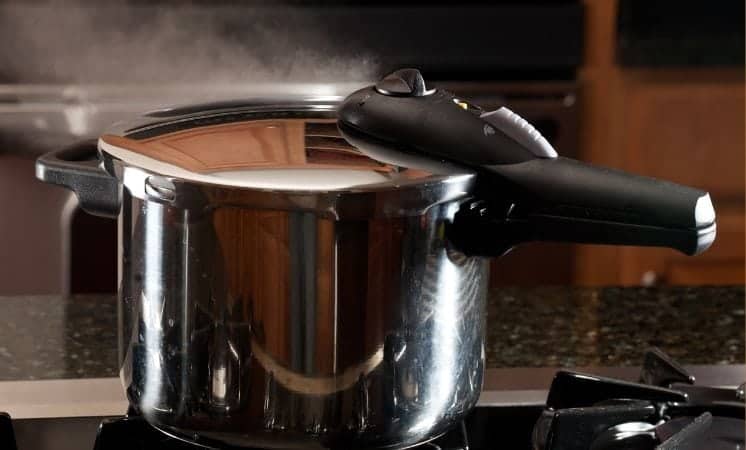Although pressure cookers are now a prevalent kitchen appliance that saves time and effort, they still have their own problems.
Although pressure cookers have advanced mechanisms and improved technology, they still experience issues that affect the cooking time and quality of the food.
The reason for pressure cooker leaks is often due to wear and tear from usage, the need for replacement parts, and potential problems with gasket seals. Despite consulting the owner’s manual, finding a solution may still be difficult, but we can help.
If you are wondering why your pressure cooker is leaking, the primary reason for this could be due to problems with the lid rim, the gasket that ensures a tight seal, or the accumulation of food particles during pressure buildup.
Examining the reasons behind these problems that result in leakage and finding ways to avoid it in the future is essential.
Reasons Why Your Pressure Cooker Is Leaking
The most frequent causes of pressure cooker leakage will be discussed in this article.
- If your pressure cooker is leaking vapor from the sides of the lid, releasing vapor out of the pressure valves, or failing to build up enough pressure, it could be due to a faulty gasket.
- Incorrect installation of the gasket can cause leaks in your pressure cooker. It is common for gaskets to be shipped inside out, with the notched side facing up. However, this side should be placed on the outside to match the lip of the lid; otherwise, placing it on the inside will result in leaks.
- If your gasket has divets or injection molding artifacts, it can result in leakage, indicating a faulty gasket.
- Excessive steam escaping from the pressure cooker indicates that the desired pressure cannot be achieved, and this is usually a sign of a faulty or unclean gasket.
- Vapors being released from the vent pipes of your pressure cooker are a common occurrence, but if you notice an excessive amount of vapors or food particles in the vent pipe, it could indicate a buildup of debris.
- If you notice vapors or water seeping out from the edge of your pressure cooker, it may be due to the use of a regulated weight system. Once the desired pressure level is reached, the leakage should stop. However, if it persists even after reaching maximum pressure, it is advisable to inspect and clean the vent pipe.
- If your pressure cooker has a distorted lid, whether due to overheating, aging, or accidental dropping, it can cause steam to escape from the cooker, especially if it is made of aluminum.
- When the rim of your pressure cooker’s base is damaged, it can result in an insufficient seal, leading to leakage. The only remedy for this issue is to acquire new parts or invest in a replacement pressure cooker.
- If the metal latch on the front underside of your pressure cooker lid is bent, it won’t be able to apply sufficient downward pressure on the lid, which can result in a leak.
- Continuous leakage of the float valve may indicate the presence of food debris on the silicone seal or a worn-out seal.
How To Stop a Pressure Cooker From Leaking?

Stopping a pressure cooker from leaking depends on the location and cause of the leak, but there are some general tips that can be helpful.
- Gasket: In case of a damaged or defective gasket, it is recommended to replace it entirely, while if the gasket is only dirty and clogged with food particles, removing and cleaning it before reinstalling it correctly should solve the issue.
- Vent Pipe Leakage: The initial step to take is to inspect the vent pipes for any food debris and clean them if found. If there are no food particles, ensure that your pressure cooker is correctly weighted during operation.
- Latch Handle: In case you notice that the latch handle is deformed, it will require a replacement. Nevertheless, if it is not bent, it might be because it is not in the sealing position; therefore, verify that it is correctly sealed.
- Leakage of steam from the sides: Verify the presence of a sealing ring or gasket and ensure that it is not stretched, impaired, or contaminated with food particles. You can either clean the gasket, replace it with a new one, or put it in the freezer for a couple of minutes to contract it.
- Warped Lid/Damaged Rim: You can either opt to replace the lid and any damaged parts or buy a new pressure cooker altogether.
How Do You Maintain a Pressure Cooker Gasket to Prevent It From Leaking?
To avoid leakage and damage to your pressure cooker’s gasket (sealing ring), it is important to take the following steps, as the gasket can be made of rubber, silicone, or a combination of both:
- Thoroughly clean your pressure cooker’s gasket after each use by removing it from the lid and washing it with soapy water, but avoid putting it in the dishwasher. Inspect the gasket for any signs of damage or wear and tear, such as cracks, which can prevent proper sealing during use. Cleaning it regularly will prevent food particle buildup and ensure a proper seal. Remember to completely dry the gasket before reinstalling it.
- Tips to Extend the Life of Your Pressure Cooker. Ensure to clean the rim with a damp cloth after cooking to remove any food particles before unlocking the lid, as leaving them may cause damage to the gasket. It is important not to let your pressure cooker run dry as it can harm the gasket, so always use enough water when cooking. If you have an older gasket, it may become brittle or dry, but soaking it in hot water for five to fifteen minutes before use can help temporarily, although eventually, you will need to replace it.
- Proper Storage Techniques. It is acceptable to keep the gasket inside the lid, but it is important not to store the pressure cooker with a locked lid as this may cause compression of the gasket. If you have an extra gasket, store it in a plastic bag and if your surroundings are humid, use baking soda to prevent moisture accumulation.
Do you apply oil to your pressure cooker’s gasket?
No. The gasket in a pressure cooker can have its lifespan shortened if it becomes too hot due to oil, which also has the potential to cause the gasket to stick to the metal and tear when lifting the lid, as well as accumulate dirt and food debris that can wear it down; however, newer models of pressure cookers are equipped with silicone gaskets that eliminate the need for oil.
Why Does My Pressure Cooker Leak from the Handle?
Depending on the type of pressure cooker you have, a leak from the handle may not necessarily be a problem.
If your pressure cooker has a steam pressure valve in the handle, which releases steam to regulate pressure, then you need not worry about any leaks as it is normal to observe condensation or light vapors.
If the pressure in your pressure cooker continues to release even after reaching the desired level, it could indicate a pressure control failure. To troubleshoot this issue, ensure that your pressure cooker is working correctly by checking the following:
- Check if the screws surrounding the handle are loose and tighten them to see if it resolves the pressure cooker leak issue.
- When you shut the lid of your pressure cooker, if the handle is not sealing or locking properly, it can cause water to leak out. Therefore, it is essential to inspect the handle for any warping, denting, or bending that may have occurred.
- It is important to verify if the water is genuinely leaking from the handle as sometimes, water may leak from the rim or lid of the pressure cooker and trickle down to the handle, creating an illusion that the leakage is originating from the handle.
- Ensure that the handle is correctly positioned and not in the venting mode.
You can also check this video about “Why Does My Pressure Cooker Leak?”
Check out our top 10 reviews!
Related posts
https://fillmorekitchen.com/can-you-eat-hot-dogs-left-out-overnight/
https://fillmorekitchen.com/can-you-air-fry-in-a-pressure-cooker/
https://fillmorekitchen.com/should-you-freeze-bananas-with-or-without-peel/
https://fillmorekitchen.com/can-you-drink-coffee-left-out-overnight/
https://fillmorekitchen.com/does-sriracha-need-to-be-refrigerated/



